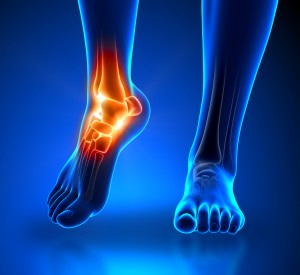Achilles Tendonitis / Tendonosis
Achilles Tendonitis and Achilles Tendonosis are common conditions that cause ankle and leg pain. It is important to distinguish between Achilles Tendonitis and Achilles Tendonosis. Achilles Tendonitis is the painful inflammation, swelling and irritation of the Achilles tendon. In contrast, Tendonosis is caused by chronic overuse, repeated injury and not allowing sufficient time for the tendon to heal. Tendonosis causes degeneration without inflammation, leading to the weakening of the tendon and thickening as scar tissue builds to repair the tendon.
 The Achilles tendon connects your calf muscles at the back of your leg to your heel bone. When your calf muscles contract, they pull on the Achilles tendon, causing your foot to point down and helping you to rise on your toes. The Achilles tendon helps you to walk, run and jump. Too much stress on the Achilles tendon can lead to Achilles Tendonitis or Tendonosis. In Achilles Tendonitis, the strain can affect different parts of the muscle and tendon, including the center of the muscle and where the muscles join the Achilles tendon.
The Achilles tendon connects your calf muscles at the back of your leg to your heel bone. When your calf muscles contract, they pull on the Achilles tendon, causing your foot to point down and helping you to rise on your toes. The Achilles tendon helps you to walk, run and jump. Too much stress on the Achilles tendon can lead to Achilles Tendonitis or Tendonosis. In Achilles Tendonitis, the strain can affect different parts of the muscle and tendon, including the center of the muscle and where the muscles join the Achilles tendon.
Symptoms and Causes of Achilles Tendonitis / Tendonosis
The main symptom of Achilles Tendonitis is mild or severe pain at the back of your calf or above your heel bone, which may occur after running or another sports activity. Other symptoms of Achilles Tendonitis include: noticeable swelling and tenderness, weakness, stiffness in the morning (which improves with activity), and pain the day after exercising. You may hear a creaking or cracking noise when you press on the Achilles tendon. Walking (especially pushing off on your toes), climbing stairs and going uphill may increase the pain of Achilles Tendonitis. Your pain may become severe after a long run, sprinting, or climbing stairs.
Achilles Tendonosis is caused by repetitive and intense strain on the Achilles tendon. Increasing the intensity of your workout suddenly can cause Achilles Tendonosis. A severe injury to the Achilles tendon can also cause Achilles Tendonosis. Sports that cause you to quickly start and stop, exercising on uneven ground, running uphill and insufficient warm-up time can all contribute to Achilles Tendonosis. Other factors that may lead to a greater risk of developing chronic Achilles pain, include: poor fitting or worn-out shoes, weak or tight calf muscles, bone spurs, flat arches, and feet that roll inward. Obesity, diabetes, high blood pressure, the use of steroids and antibiotics can also lead to a greater risk of developing Achilles Tendonosis. Athletes in the following sports may be affected by Achilles Tendonosis: running, basketball, jumping sports, and dancing. In running, a sudden increase in the intensity or duration of your run can lead to Achilles Tendonosis. In jumping sports, landing on the ground after a jump can force the foot upward and cause an injury. Achilles Tendonosis is also common in sedentary middle-aged adults who work-out and participate in sports only on the weekends. As tendons age, they tolerate less stress, are less elastic, and tear more easily, making middle age adults more vulnerable to developing Achilles Tendonosis.
Diagnosis and Treatment of Achilles Tendonitis / Tendonosis
Achilles Tendonitis and Tendonosis are not the only causes of leg and ankle pain, so it is important to get evaluated by a physician to determine a diagnosis. Left untreated, Achilles Tendinitis and Achilles Tendonosis may result in tendon tears or ruptures, and can become chronic making it difficult to walk. At Houston Sports Medicine, Dr. Shaun Lehmann strives to treat leg and ankle pain with nonsurgical treatment options that help your body to naturally heal itself. Our physician has years of experience treating pain, and they offer multiple nonsurgical treatment options for their patients, including: Physical Therapy, Prolotherapy, and Platelet Rich Plasma (PRP). During your initial evaluation, your physician will get a medical history, complete a physical exam, and determine if any diagnostic imaging such as MRI needs to be completed. Diagnostic Ultrasound is also available in the office in order to evaluate the health of musculoskeletal structures and tendons. Once you have been evaluated, our physicians will determine a plan of treatment best suited for your condition.
Sports that cause you to quickly start and stop, exercising on uneven ground, running uphill and insufficient warm-up time can all contribute to Achilles Tendonosis. Other factors that may lead to a greater risk of developing chronic Achilles pain, include: poor fitting or worn-out shoes, weak or tight calf muscles, bone spurs, flat arches, and feet that roll inward.
Houston Sports Medicine is located in The Woodlands, TX. We are easily reached from Conroe, Spring, Magnolia, Tomball, Cypress, Kingwood and most other areas of Houston.
